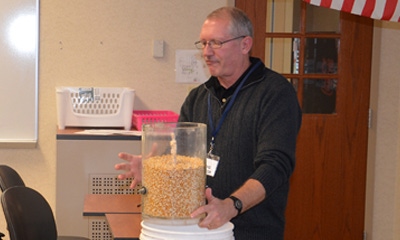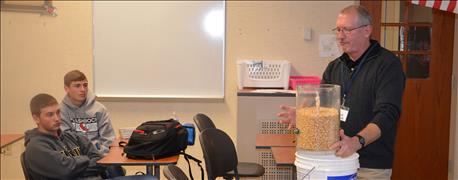
Forty years is a long time to do anything. Recently, two Indiana agriculture teachers retired who both had taught for roughly four decades. Other teachers are also expected to retire yet this year. The question is not who will fill their shoes, as much as “Will their shoes be filled?” There is an extreme shortage of ag teachers.
Dan Webb greeted well-wishers recently at a retirement celebration held at Tri High School in Henry County. After starting teaching at Clinton Prairie, Webb moved to Tri High in 1980. He and his wife, Martha, made their lives there. Webb taught at Tri High from 1980 through this school year.

STRONG DEMAND: Mike Manning, Purdue University Extension farm safety specialist, presents a program to agriculture students. More than 20 teachers are currently needed to fill openings for fall 2016.
Joe McCain, who lives near Greenfield — in neighboring Hancock County about 20 miles back to the west along U.S. 40 — also was surprised with a retirement party recently. He’s retiring after 41 years in teaching.
“I went to Greenfield Central High School, and I never left,” McCain says. “I spent my whole career in that school district.”
Several other longtime agriculture teachers are retiring this year. Expect to learn more about them in upcoming articles.
Normally, when someone retires after a long tenure at one school, the questions is who can fill those shoes. Indeed, both Webb and McCain leave very big shoes to fill after successful careers teaching agriculture, guiding successful FFA programs and shepherding various community service efforts in their respective communities. But this time the question is even more dire. Will there be anyone to even try to fill their shoes?
Both Greenfield Central and Tri High are actively seeking teachers to fill these positions vacated by retirement. There is an extremely limited pool of candidates.
Bleak picture
As most schools ended sessions for the year recently, there was a big number of schools still looking for an ag teacher. The list of open positions maintained by Purdue University showed more than 20 vacancies where schools were actively seeking teachers. This was current at the end of May.
That figure doesn’t count a number of schools who have already given up and made adjustments, deciding they won’t be able to find a teacher. Most of those haven’t been confirmed, but rumors are that some will close their ag program because they can’t find a teacher.
The problem is not limited to Indiana. A well-placed source in Wisconsin says there is also a shortage of ag teachers in that state. And the same source says several schools in Wisconsin, especially in more remote rural areas, have already closed the ag program, citing that they have no teacher to continue the program.
Purdue University sources indicate there were only a dozen new graduates this spring, and some of them chose not to teach. If there’s a glimmer of hope, it’s that expected incoming classes for the next two years in the ag education program at Purdue feature higher numbers than in the recent past.
About the Author(s)
You May Also Like




